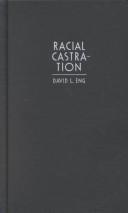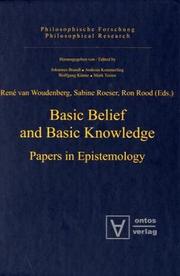| Listing 1 - 10 of 10 |
Sort by
|

ISBN: 0822326310 0822326361 9786613062062 1283062062 0822381028 9780822381020 Year: 2001 Publisher: Durham, N.C. Duke University Press
Abstract | Keywords | Export | Availability | Bookmark
 Loading...
Loading...Choose an application
- Reference Manager
- EndNote
- RefWorks (Direct export to RefWorks)
A psychoanalytic study that argues for the centrality of sexuality in the construction of Asian-American identity, and of racial identity in general.--
Sociology of minorities --- Sociology of the family. Sociology of sexuality --- Thematology --- American literature --- Asian Americans --- Race identity --- Masculinity --- United States --- Sex role --- Race --- Psychological aspects --- Asian American authors --- History and criticism --- Asian Americans in literature --- Kingston, Maxine Hong --- Chin, Frank Chew --- Hwang, David Henry --- Chu, Louis --- Louie, David Wong --- Asian Americans in literature. --- Asians --- Ethnology --- Physical anthropology --- Race identity. --- Psychological aspects. --- History and criticism. --- Intellectual life.
Book
ISBN: 9780822347156 9780822347323 Year: 2010 Publisher: Durham Duke university press.
Abstract | Keywords | Export | Availability | Bookmark
 Loading...
Loading...Choose an application
- Reference Manager
- EndNote
- RefWorks (Direct export to RefWorks)
Asian American gays --- Asian Americans --- Gay liberation movement --- Kinship --- Family relationships

ISBN: 1597347221 9786613277121 0520936272 1283277123 9780520936270 1417520078 9781417520077 9781597347228 9780520232358 0520232356 9780520232365 0520232364 0520232356 0520232364 Year: 2003 Publisher: Berkeley University of California Press
Abstract | Keywords | Export | Availability | Bookmark
 Loading...
Loading...Choose an application
- Reference Manager
- EndNote
- RefWorks (Direct export to RefWorks)
Taking stock of a century of pervasive loss-of warfare, disease, and political strife-this eloquent book opens a new view on both the past and the future by considering "what is lost" in terms of "what remains." Such a perspective, these essays suggest, engages and reanimates history. Plumbing the cultural and political implications of loss, the authors--political theorists, film and literary critics, museum curators, feminists, psychoanalysts, and AIDS activists--expose the humane and productive possibilities in the workings of witness, memory, and melancholy. Among the sites of loss the authors revisit are slavery, apartheid, genocide, war, diaspora, migration, suicide, and disease. Their subjects range from the Irish Famine and the Ottoman slaughter of Armenians to the aftermath of the Vietnam War and apartheid in South Africa, problems of partial immigration and assimilation, AIDS, and the re-envisioning of leftist movements. In particular, Loss reveals how melancholia can lend meaning and force to notions of activism, ethics, and identity.
Social history --- Loss (Psychology) --- Psychic trauma --- Melancholy --- Melancholy in literature. --- Dejection --- Emotions --- Depression, Mental --- Sadness --- Emotional trauma --- Injuries, Psychic --- Psychic injuries --- Trauma, Emotional --- Trauma, Psychic --- Psychology, Pathological --- Psychology --- Social aspects. --- Social history - 20th century --- Loss (Psychology) - Social aspects --- Psychic trauma - Social aspects --- Melancholy - Social aspects --- Melancholy in literature --- aids. --- anthology. --- apartheid. --- culture of grief. --- diaspora. --- disease. --- ethics. --- feminists. --- film critics. --- genocide. --- grief. --- history. --- human condition. --- identity. --- irish famine. --- life lessons. --- literary critics. --- memory. --- migration. --- mourning. --- nonfiction essays. --- ottoman slaughter. --- overcoming loss. --- personal journey. --- political activists. --- political issues. --- political theorists. --- psychology of loss. --- realistic. --- slavery. --- social politics. --- suicide. --- tragic. --- vietnam war. --- warfare. --- witness.
Book
ISBN: 1921666730 1921666757 9781921666759 9781921666735 Year: 2010 Publisher: Acton, A.C.T. : ANUE Press,
Abstract | Keywords | Export | Availability | Bookmark
 Loading...
Loading...Choose an application
- Reference Manager
- EndNote
- RefWorks (Direct export to RefWorks)
"Ethics is a vigorously contested field. There are many competing moral frameworks, and different views about how normative considerations should inform the art and craft of governmental policy making. What is not in dispute, however, is that ethics matters"-- "This edited volume brings together a selection of 12 papers that were originally delivered at a major conference - Ethical Foundations of Public Policy - in December 2009 in Wellington, New Zealand. The conference was co-hosted by the Institute of Policy Studies and the Philosophy Programme at Victoria University of Wellington, and the Centre for Theology and Public Issues at the University of Otago, and was sponsored by the School of Government Trust. The conference was very well attended with some 350 participants, of whom about 50 delivered papers. The purpose of the conference was to encourage and facilitate debate about the ethical basis for policy making. This includes, of course, the ethical principles that should inform our behaviour, whether as citizens, voters, policy analysts, or decision makers, as well as the normative considerations that should guide our choices over the substantive content of particular policies - whether fiscal policy, health policy, or foreign policy"--
Ethics --- Decision making --- Social values --- Philosophy --- Philosophy & Religion --- Moral and ethical aspects --- Social values. --- Moral and ethical aspects. --- Decision-making (Ethics) --- Deontology --- Ethics, Primitive --- Ethology --- Moral philosophy --- Morality --- Morals --- Philosophy, Moral --- Science, Moral --- Values

ISBN: 0520232356 0520232364 9780520232365 9780520232358 Year: 2003 Publisher: Berkeley London : University of California Press,
Abstract | Keywords | Export | Availability | Bookmark
 Loading...
Loading...Choose an application
- Reference Manager
- EndNote
- RefWorks (Direct export to RefWorks)
Taking stock of a century of pervasive loss—of warfare, disease, and political strife—this eloquent book opens a new view on both the past and the future by considering "what is lost" in terms of "what remains." Such a perspective, these essays suggest, engages and reanimates history. Plumbing the cultural and political implications of loss, the authors--political theorists, film and literary critics, museum curators, feminists, psychoanalysts, and AIDS activists--expose the humane and productive possibilities in the workings of witness, memory, and melancholy. Among the sites of loss the authors revisit are slavery, apartheid, genocide, war, diaspora, migration, suicide, and disease. Their subjects range from the Irish Famine and the Ottoman slaughter of Armenians to the aftermath of the Vietnam War and apartheid in South Africa, problems of partial immigration and assimilation, AIDS, and the re-envisioning of leftist movements. In particular, Loss reveals how melancholia can lend meaning and force to notions of activism, ethics, and identity.
Social history --- Loss (Psychology) --- Psychic trauma --- Melancholy --- Melancholy in literature --- Social aspects --- Melancholy in literature. --- Social aspects. --- Emotional trauma --- Injuries, Psychic --- Psychic injuries --- Trauma, Emotional --- Trauma, Psychic --- Psychology, Pathological --- Dejection --- Emotions --- Depression, Mental --- Sadness --- Psychology --- Social history - 20th century --- Loss (Psychology) - Social aspects --- Psychic trauma - Social aspects --- Melancholy - Social aspects
Book
ISBN: 9781439921098 9781439921081 Year: 2021 Publisher: Philadelphia : Temple University Press,
Abstract | Keywords | Export | Availability | Bookmark
 Loading...
Loading...Choose an application
- Reference Manager
- EndNote
- RefWorks (Direct export to RefWorks)
"First published in 1998, Q & A: Queer in Asian America, edited by David L. Eng and Alice Y. Hom, became a canonical work in Asian American studies and queer studies. This new edition of Q & A is neither a sequel nor an update, but an entirely new work borne out of the progressive political and cultural advances of the queer experiences of Asian North American communities. The artists, activists, community organizers, creative writers, poets, scholars, and visual artists that contribute to this exciting new volume make visible the complicated intertwining of sexuality with race, class, gender, and ethnicity. Sections address activism, radicalism, and social justice; transformations in the meaning of Asian-ness and queerness in various mass media issues of queerness in relation to settler colonialism and diaspora; and issues of bodies, health, disability, gender transitions, death, healing, and resilience. The visual art, autobiographical writings, poetry, scholarly essays, meditations, and analyses of histories and popular culture in the new Q & Agesture to enduring everyday racial-gender-sexual experiences of mis-recognition, micro-aggressions, loss, and trauma when racialized Asian bodies are questioned, pathologized, marginalized, or violated. This anthology seeks to expand the idea of Asian and American in LGBTQ studies." --
Asian American gays --- Asian American lesbians --- Asian American bisexuals --- Gays --- Lesbians --- Transgender people --- Bisexuals --- Queer theory. --- Social conditions. --- Identity. --- Asian American gay people --- Gay people --- Asian American bisexual people --- Bisexual people


ISBN: 3110327511 9783110327519 9783937202709 3937202706 3110327279 9783110327274 3937202706 9783110327274 Year: 2013 Volume: Bd. 4 Publisher: Berlin Boston
Abstract | Keywords | Export | Availability | Bookmark
 Loading...
Loading...Choose an application
- Reference Manager
- EndNote
- RefWorks (Direct export to RefWorks)
Over the last two decades foundationalism has been severely criticized. In response to this various alternatives to it have been advanced, notably coherentism. At the same time new versions of foundationalism were crafted, that were claimed to be immune to the earlier criticisms. This volume contains 12 papers in which various aspects of this dialectic are covered. A number of papers continue the trend to defend foundationalism, and foundationalism's commitment to basic beliefs and basic knowledge, against various attacks. Others aim to show that one important objection against coherentism, viz. that the notion of 'coherence' is too vague to be useful, can be countered.
Digital

ISBN: 9783110327519 9783110327274 Year: 2013 Publisher: Berlin ;; Boston De Gruyter
Abstract | Keywords | Export | Availability | Bookmark
 Loading...
Loading...Choose an application
- Reference Manager
- EndNote
- RefWorks (Direct export to RefWorks)
Book

ISBN: 9780813549330 0813549337 9780813545745 9780813545752 0813545749 0813545757 Year: 2010 Publisher: New Brunswick, NJ
Abstract | Keywords | Export | Availability | Bookmark
 Loading...
Loading...Choose an application
- Reference Manager
- EndNote
- RefWorks (Direct export to RefWorks)
Digital

ISBN: 9780813549330 9780813545745 Year: 2010 Publisher: New Brunswick, N.J. Rutgers University Press
Abstract | Keywords | Export | Availability | Bookmark
 Loading...
Loading...Choose an application
- Reference Manager
- EndNote
- RefWorks (Direct export to RefWorks)
| Listing 1 - 10 of 10 |
Sort by
|

 Search
Search Feedback
Feedback About UniCat
About UniCat  Help
Help News
News